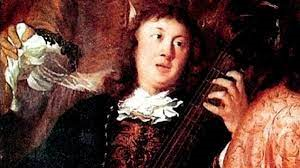Dietrich Buxtehude (1637–1707) was a renowned Baroque composer and organist who significantly influenced the musical world. Although much of his life remains shrouded in mystery, his contributions to organ music and the development of Baroque style are profound. Here are five intriguing curiosities about this legendary composer:
1. The Legendary Organist Who Inspired J.S. Bach
One of the most famous stories involving Buxtehude is his influence on the young Johann Sebastian Bach. In 1705, a 20-year-old Bach walked over 250 miles from Arnstadt to Lübeck just to hear Buxtehude play. Bach was so impressed by Buxtehude’s music that he extended his stay from a few weeks to nearly three months. Buxtehude’s influence on Bach’s music can be seen in Bach’s complex fugues and his development of German organ music.
2. The Lübeck “Abendmusiken” Concerts
Buxtehude is credited with transforming the evening concerts at St. Mary’s Church in Lübeck, known as the Abendmusiken, into a significant cultural event. These concerts were open to the public and became some of the most prestigious musical gatherings in Northern Europe. Held during Advent, the Abendmusiken attracted music lovers and notable composers, turning Lübeck into a center for Baroque music.
3. The Unusual Marriage Requirement
Buxtehude’s position as the organist of St. Mary’s Church came with a peculiar stipulation—his successor was expected to marry his eldest daughter. It was a tradition in the church that his predecessor had also followed. When Buxtehude grew older, several notable composers, including Handel and Mattheson, visited Lübeck and were considered for the post. However, both declined due to the marriage condition.
4. Mystery Surrounding His Early Life
Although Buxtehude’s influence on music is well-documented, many details about his early life remain uncertain. It is believed he was born in either Helsingborg (now in Sweden) or in Bad Oldesloe (now in Germany). His father was an organist, which likely sparked his early interest in music, but records from Buxtehude’s youth are scarce, leaving historians to piece together his early years through conjecture.
5. A Master of Organ and Vocal Music
While Buxtehude is best known for his organ works, especially his preludes and fugues, he was also a master of vocal music. His sacred cantatas and choral works are profound examples of his ability to blend intricate counterpoint with emotional depth. His works for choir and orchestra, like Membra Jesu Nostri, are some of the earliest known examples of Passion oratorios, a form that would later become a cornerstone of Baroque sacred music.
Conclusion
Dietrich Buxtehude’s legacy as a composer and organist lives on in the works of those he influenced, particularly Johann Sebastian Bach. His music, characterized by its complexity, expressiveness, and spirituality, continues to inspire musicians and music lovers alike. Through his contributions to the Baroque era, especially his organ compositions and public concerts, Buxtehude solidified his place as one of the great composers of his time.


Comments are closed